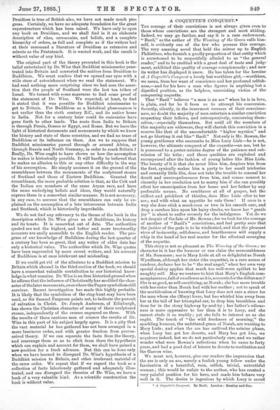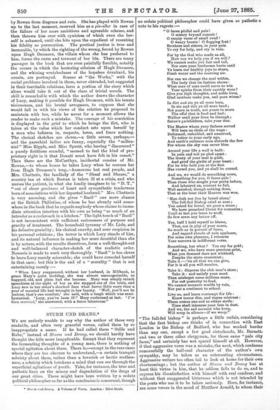A COQUETTE'S CONQUEST.*
THE courage of their convictions is not always given even to those whose convictions are the strongest and most abiding. Indeed, we may go farther, and say it is a rare endowment. "Basil," as the author of The Wearing of the Green calls himself, is evidently one of the few who possess this courage. The very amusing novel that held the mirror up to English Philistines, who furnish a goodly proportion of that entity which is accustomed to be respectfully alluded to as "the general reader," and to be credited with a great deal of taste and judgment, exhibited this quality of courage conspicuously ; and now its writer has displayed it anew. He has taken for the heroine of A Coquette's Conquest a lovely but worthless girl,--worthless, we mean, from her want of conscience and her profound selfishness,—and for his hero a man who figures in anything but a dignified position, as the helpless, unresisting victim of the conquering coquette.
That " Basil " believes "a man is an ass" when he is in love, is plain, and far be it from us to attempt his conversion. Secretly, silently, in the innermost recesses of their consciousness, no doubt the majority of men entertain a similar conviction respecting their fellows, and retrospectively, concerning themselves,—especially themselves. But until all the members of this majority are widowers, they will cherish this conviction in a reserve like that of the uncomfortable "higher mystics," and not go blurting it out like " Basil." Not only is Mr. Rowan, the young gentleman who succumbs to Miss Lucy Lisle—he is not, however, the ultimate conquest of the coquette—an ass, but he is possessed to a preter-asinine degree of the patience and submission of his tribe ; and those qualities are exploited and recompensed after the fashion of young ladies like Miss Lisle. The beauty of it is that she never likes him, despises him from the first, cynically makes him a party to her small trickeries and cowardly little fibs, does not take the trouble to conceal her deceit and unscrupulousness from him, and comes nearest to sincerity in her resolution not to marry him if she can possibly effect her emancipation from her home and her father by any preferable means. No semblance at all of grapes, but the stiffest and prickliest of thistles, does Miss Lisle offer to her ass ; and with what an appetite he eats them ! If once in a way she does stick a musk-rose or two in his smooth ears, and drop a careless kiss upon his hairy cheeks, we know her "gentle joy" is about to suffer severely for the indulgence. Yet do we not despair of the fate of Mr. Rowan ; for we look for the courage of another of " Basil's " convictions, and feel pretty sure that the justice of the gods is to be vindicated, and that the pleasant vices of insincerity, selfishness, and heartlessness will supply a whip in the hand of her real master for the effectual scourging of the coquette.
This story is not so pleasant as The Wearing of the Green; no character in it has the humour or can claim the memorableness of Mr. Summers ; nor is Mary Lisle at all so delightful as Norah Wyndham, although her sister (the coquette), in a rare access of candour, declares her to be" the real angel," when her own very special donkey applies that much too well-worn epithet to her naughty self. May we venture to hint that Mary's English commonplaceness, full of excellence as it is, accounts for the difference P. She is as good, as self-sacrificing, as Norah ; she has more trouble with her sister than Norah had with her mother ; not to speak of the mortification of knowing that Lucy does not care a straw for the man whom she (Mary) loves, but has whirled him away from her at the tail of her triumphal car, to drop him breathless and done for in the stony highway by-and-by ; her father's odiousness is more oppressive to her than it is to Lucy, and she cannot elude it so readily ; yet she fails to interest us as she ought. The touch of "the wild freshness of morning," the sparkling humour, the unfettered grace of Norah, are wanting to Mary Lisle; and when the ass has outlived the asinine phase, when Lucy has got her deserts, and Mary has got him, we acquiesce indeed, but we do not particularly care, and we rather wonder what were Rowan's reflections when he came to forty years, and had a good deal of leisure to devote to meditation and the Ge.scon wine.
We must not, however, give our readers the impression that the ass is only an ass, merely a foolish young fellow under the fascination of a beautiful, vain, selfish, trivial, untruthful woman ; this would be unfair to the author, who has erected a very painful position for his hero, and made him behave very well in it. The device is ingenious by which Lucy is saved by Rowan from disgrace and ruin. She has played with Rowan up to the last moment, reserved him as a pis-aller in case of the failure of her more ambitious and agreeable scheme, and then thrown him over with cynicism of which even she herself is ashamed, until she hits upon the expedient of resenting
his fidelity as persecution. The poetical justice is true and inexorable, by which the righting of the wrong, forced by Rowan upon Hugh Dromore, the villain whom she has preferred to him, forms the curse and torment of her life. There are many passages in the book that are even painfully forcible, notably the scenes in which the hectoring atheism of Hugh Dromore, and the whining wretchedness of the hopeless drunkard, his cousin, are portrayed. Scenes at "the Works," with the social problems involved in them, never obtruded, but suggested in their inevitable relations, form a portion of the story which alone would take it out of the class of trivial novels. The skill is remarkable with which the author draws the character of Lucy, making it possible for Hugh Dromore, with his innate viciousness, and his brutal arrogance, to suppose that she would fall in with his views of the relation he proposed to maintain with her, while he never for a moment allows the reader to make such a mistake. The courage of his conviction is displayed in the grief to which he brings the flirt, who is
taken at the value which her conduct sets upon herself by a man who believes in, respects, loves, and fears nothing.
The clerical sketches are clever,—a little severe, perhaps,— and the parochial ladies are funny, especially the " millennial " Miss Ripple, and Miss Sprott, who having " discovered " a purely fictitious scandal, "seemed to feel the kind of proprietary right in it that Donati must have felt in his comet." Then there are the McCarthys, incidental cousins of Mr.
Rowan,—to whose house he takes Lucy when he rescues her from Hugh Dromore's trap,—humorous but real people, and
Mrs. Chatteris, the landlady of the "Sheaf and Shears," a country inn at which Rowan is taken ill at a crisis, and who nurses the patient, in what she fondly imagines to be "D. T.," "out of sheer goodness of heart and sympathetic tenderness
born of associations with her departed husband." Mrs. Chatteris is very amusing, and she gives " Basil " one more chance at the British Philistine, of whom he has already said somewhere in the book that be regards anybody whose claims to imme diate attention interfere with his own as being "as much of an intruder as a cockroach in a kitchen." The light touch of "Basil" is not inconsistent with sufficient seriousness of purpose and gravity of treatment. The household tyranny of Mr. Lisle, and his delusive geniality; his clerical suavity, and sour suspicion in his personal relations ; the terror in which Lucy stands of him, and its natural influence in making her more deceitful than she is by nature, with the results therefrom, form a well-thought-out and well-balanced character-sketch of the realistic order. Nemesis is made to work very thoroughly. "Basil" is too clever to leave Lucy merely miserable; she could have consoled herself in that case; but this is the end of a " morality " that is not entertaining merely :—
"When Lucy reappeared, without her husband, in Millbank, to grace Mary's quiet wedding, she was almost unrecognisable, so haggard, old, and plain had she become. Mary was simply struck speechless at the sight of her as she stepped out of the train, and Lacy saw in her sister's shocked face what havoc little more than a year of married life had wrought in her beauty. Well, you'll not be jealous, that's one comfort,' she said, with a laugh which was semihysterical. 'Lucy, you've been ill Mary exolaimed at last. 'I've been married,' she answered, with a fierce bitterness."



































 Previous page
Previous page